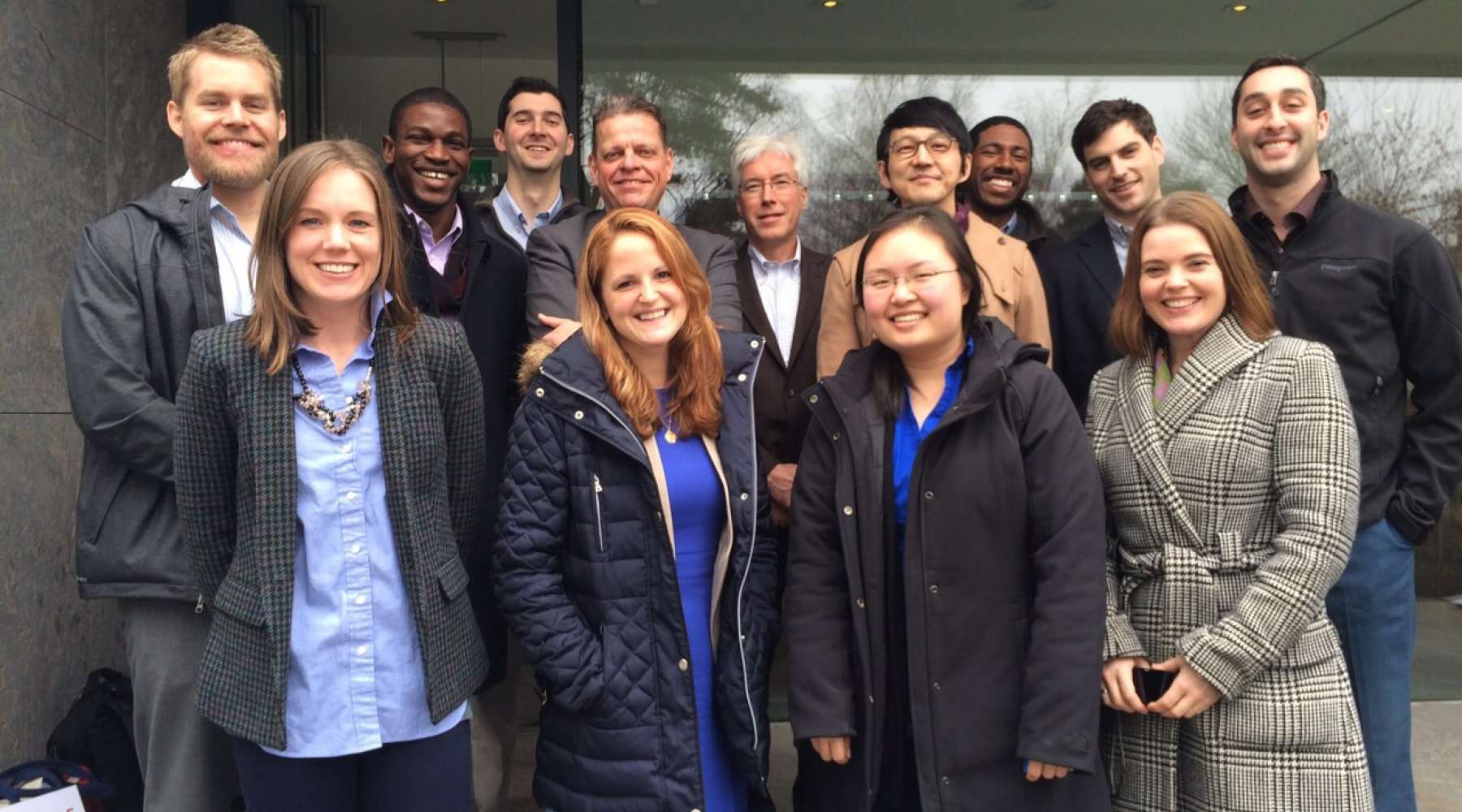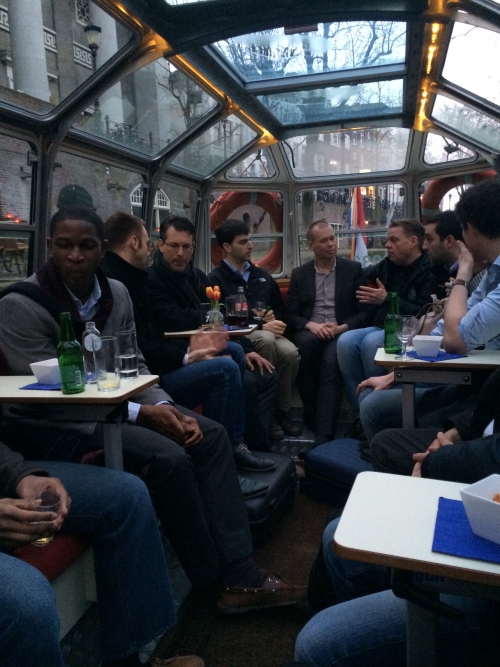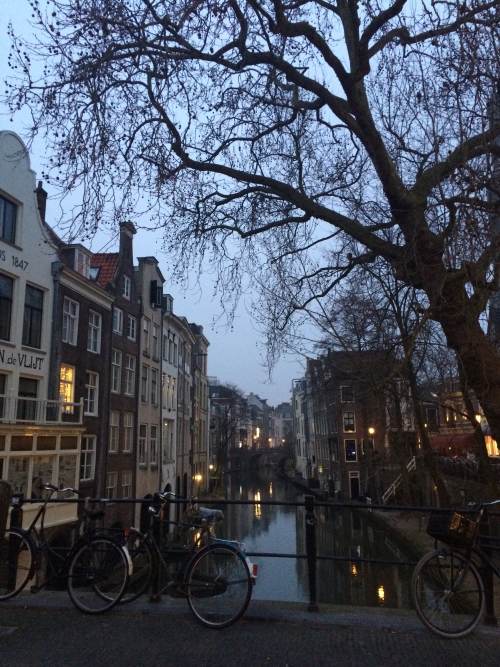
By Eric Giles T’16, Robin Daley T’16, and Bryan Pyfer T’16
Ten students traveled to the Netherlands over spring break to attend a Global Insight Expedition (GIX) led by Bob Hansen, senior associate dean and the Norman W. Martin 1925 Professor of Business Administration. Global Insight Expeditions offer students opportunities to travel to a variety of countries to learn how business is done around the world. They learn about each country's unique business environment, opportunities for social entrepreneurship, and the role of business people in addressing social challenges.
These three students offer their biggest takeaways from their time in the Netherlands.
Eric T’16
 Eric is a career switcher who transitioned from an education nonprofit—Teach For America—to the health care sector. He hopes to expand health access to all populations.
Eric is a career switcher who transitioned from an education nonprofit—Teach For America—to the health care sector. He hopes to expand health access to all populations.
I came to Tuck knowing that I would pursue a career in making health care a more equitable industry. Like any other business entity, health care is a global concern and, like any business leader, I wanted to break out of my domestic bubble and understand how other nations are thinking about shared problems. Part of operating in the global economy means sharing information across borders and languages, and the GIX trip to the Netherlands gave me opportunities to learn from international experts that far exceeded my expectations.
The trip is a partnership between Tuck and the TIAS School for Business and Society, a top business school in the Netherlands. TIAS lined up some truly thought-provoking speakers who challenged my thinking around a range of issues. My team had deep conversations with a CEO around his assumptions about incentives, watched a former CERN scientist explain how he is using data to predict health outcomes, and engaged an ethics expert in a discussion around the Netherland’s position on euthanasia. Connecting with experts and diving into the root of major issues is what business school is all about, and as I move into my career, I will leverage the perspectives and lessons of the Dutch people.
Here are my top three takeaways:
Robin T'16
 Robin grew up in Bar Harbor, Maine. Prior to Tuck, he worked as a consultant at Charles River Associates in Boston. At Tuck, Robin is a Revers Board Fellow for the Upper Valley Haven, is a mentor for Vermont Everybody Wins!, and is co-chair of the Basketball Club. This summer, he will spend his internship at Gilbarco Veeder-Root, an operating company of Danaher Corporation.
Robin grew up in Bar Harbor, Maine. Prior to Tuck, he worked as a consultant at Charles River Associates in Boston. At Tuck, Robin is a Revers Board Fellow for the Upper Valley Haven, is a mentor for Vermont Everybody Wins!, and is co-chair of the Basketball Club. This summer, he will spend his internship at Gilbarco Veeder-Root, an operating company of Danaher Corporation.
I found the lectures by Dr. Freek Lapré—senior lecturer at TIAS and founder of Movinex BV—and Professor Loek Winter—renowned health care entrepreneur in the Netherlands—to be intriguing. Both believed that the amount of government involvement in the Netherlands should be reduced and seemed to be motivated by developments in the United States. Dr. Lapré spoke to the need for the Netherlands to move towards a more “participative” society and for long-term care facilities to develop the service standards maintained in the United States. Professor Winter’s entrepreneurialism with regard to creating focused and specialized care centers reminded me of the success CVS Health has had in the United States with Minute Clinics. However, the fact that the transfer of medical records between health care organizations is illegal in the Netherlands seems to create a problem for these specialized centers. Additionally, I found Professor Winter’s statement of “I don’t believe in non-profit organizations” to be particularly powerful in the context of the “solidarity” perspective that is prevalent in the Netherlands.
During the tour of Philips research headquarters in Eindhoven, I was also struck by Professor Nardo van der Meer’s—cardiovascular anesthesiologist and intensivist at the Amphia Hospital Breda—comment with regard to MRI waiting times in the Netherlands being a result of limited service hours; not a lack of machines. Dean Robert Hansen, who led our GIX, contrasted this with the airline industry, which gets as much utilization from its investment in fixed costs as possible by offering red-eye flights. While health care utilization in the United States is far from a 24/7 industry, I was able to receive an MRI for a non-critical condition at 10:30 p.m. the day of my visit to an orthopedic specialist last year.
The Netherlands GIX has taught me that while the United States health care system receives a lot of criticism, there are many positive aspects that are influencing other countries.
Bryan T’16
-1_(2)_120_180.jpg) Bryan is an MD/MBA candidate with a background in sales and health care consulting. I am interested in health care innovation, technology, and consumerism. After Tuck, I plan on a career as a surgeon and health care entrepreneur.
Bryan is an MD/MBA candidate with a background in sales and health care consulting. I am interested in health care innovation, technology, and consumerism. After Tuck, I plan on a career as a surgeon and health care entrepreneur.
“Here in the Netherlands, we have our rights. In the U.S., you have your benefits.” This seemed to be a common theme throughout our visit as we discussed the general tenets of the Dutch health care system. Before today, I understood that social services were a high priority in Europe, but I guess I didn’t appreciate to what extent. This idea of health care being a right seems to permeate much deeper than just who provides health care—it essentially has dictated health care laws (individual mandates), determined insurance corporate structure (not-for-profit) and pricing (a flat rate percentage of income), and care delivery (basic minimum package of services with a flat deductible for every insured citizen). The CEO of CZ remarked, “Nobody in this country goes bankrupt because of medical expenses.”
It is impressive to me how organized the Dutch government is around this idea. This has made me think about what is keeping the United States from moving in this direction? Is it the “Live Free or Die” mentality that makes people uncomfortable when the government imposes mandates like this? Is it the growing federal deficit that makes it unaffordable? Can the Netherlands do it because they are such a small country and are thus more nimble to meet the needs of its citizens? Whatever the reason, I am impressed with the government’s commitment to universal health coverage.
Hear from other Tuckies on their Global Insight Expeditions: Israel, South Africa, and Japan.
 |
 |